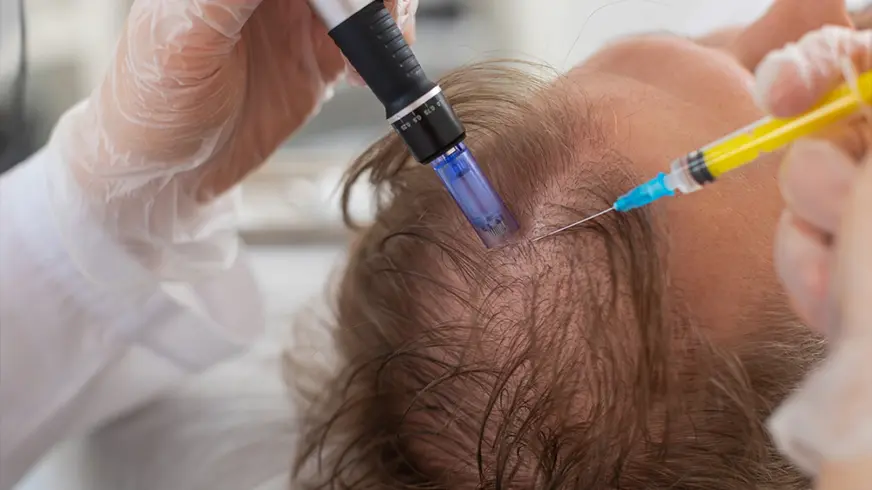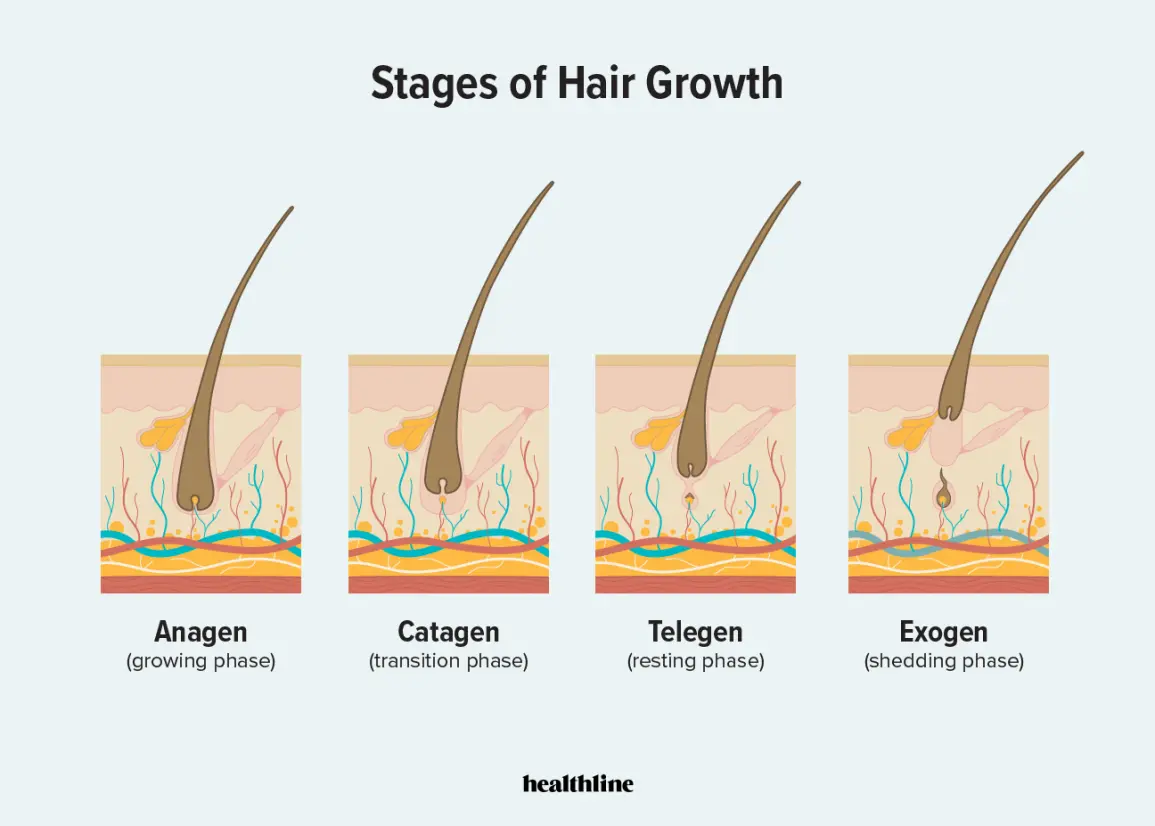What is Hair Loss (Alopecia)? A Detailed Overview
Hair loss is the progressive or sudden decrease in hair density on the scalp or body, resulting from a disruption in the natural hair growth cycle. The hair growth cycle has three main phases:
-
Anagen (Growth Phase): Lasting 2–7 years.
-
Catagen (Transition Phase): Lasting a few weeks.
-
Telogen (Resting/Shedding Phase): Lasting 2–4 months, after which the hair sheds and is replaced by a new one.
In alopecia, the Anagen phase is shortened, the Telogen phase is prolonged, or the hair follicles are damaged, leading to less dense, finer hair (miniaturization) and eventual loss.
Key Symptoms of Hair Loss
Recognizing the symptoms early is crucial:
-
Gradual Thinning on the Crown/Scalp: The most common sign, especially for Androgenetic Alopecia (pattern baldness). This may present as a receding hairline (M-shape) in men or a visible widening of the part in women.
-
Excessive Daily Shedding (Telogen Effluvium): Noticing handfuls of hair on the pillow, in the shower, or while brushing, significantly more than the normal 50–100 hairs per day.
-
Sudden, Patchy Loss (Alopecia Areata): Smooth, coin-sized, round patches of hair loss on the scalp or body.
-
Scalp Changes: Itching, burning, scaling, or blistering, which may indicate an inflammatory or Scarring Alopecia (Cicatricial Alopecia).
-
Body Hair Loss: Loss of eyebrows, eyelashes, or body hair, often linked to systemic conditions.
The Root Causes: Why Hair Loss Occurs
Effective treatment is impossible without a precise understanding of the underlying cause. Causes are often multi-factorial, meaning several issues can contribute simultaneously.
|
Category |
Specific Causes and Details |
|
Genetic/Hormonal |
Androgenetic Alopecia (Pattern Baldness): Caused by genetic sensitivity to the hormone dihydrotestosterone (DHT), which miniaturizes hair follicles. |
|
Stress & Lifestyle |
Telogen Effluvium: Triggered 2–4 months after a major physical or emotional stressor (e.g., severe illness, surgery, childbirth, extreme diet). Chronic stress elevates cortisol, negatively impacting the hair cycle. |
|
Nutritional Deficiencies |
Insufficient intake or absorption of essential nutrients, especially Iron (Ferritin), Zinc, Vitamin D, Biotin, and Protein. |
|
Medical Conditions |
Autoimmune Diseases (e.g., Alopecia Areata, Lupus), Thyroid Disorders (Hypo- or Hyperthyroidism), Polycystic Ovary Syndrome (PCOS). |
|
Medication Side Effects |
Certain chemotherapy drugs, anticoagulants, anti-depressants, and blood pressure medications. |
|
Physical Trauma |
Traction Alopecia: Caused by prolonged, excessive tension on the hair follicles from tight hairstyles (braids, extensions, ponytails). |
|
Scalp Health |
Fungal infections (e.g., Tinea Capitis), seborrheic dermatitis (severe dandruff), or harsh chemical/heat treatments. |
Types of Hair Loss Explained
Dermatologists classify hair loss based on pattern and cause:
-
Androgenetic Alopecia (AGA)
-
Description: The most prevalent type (95% of cases). It is non-scarring and progressive.
-
Male Pattern: Characterized by a receding hairline and thinning crown (Norwood Scale).
-
Female Pattern: Characterized by diffuse thinning on the crown and widening of the central part (Ludwig Scale).
-
Telogen Effluvium (TE)
-
Description: A temporary, non-scarring condition where a large number of hairs prematurely enter the Telogen (resting) phase, leading to diffuse, heavy shedding.
-
Prognosis: Usually self-resolving within 6–9 months once the trigger is removed.
-
Alopecia Areata (AA)
-
Description: An autoimmune disease causing non-scarring, smooth, round patches of hair loss. In severe cases, it can affect the entire scalp (Totalis) or the entire body (Universalis).
-
Scarring Alopecias (Cicatricial Alopecias)
-
Description: A group of rare, inflammatory conditions (e.g., Lichen Planopilaris, Frontal Fibrosing Alopecia) that permanently destroy the hair follicle, replacing it with scar tissue.
-
Urgency: Requires immediate diagnosis and aggressive treatment to halt the inflammatory destruction.
-
Traction Alopecia (TA)
-
Description: Non-scarring hair loss along the hairline and temples due to chronic pulling. It can become permanent if the tension is not stopped early.
The Dermatologist's Approach: Diagnosis at Shine Dermatology
Accurate diagnosis is the cornerstone of successful treatment. At Shine Dermatology, we employ a thorough, multi-step diagnostic protocol:
-
Detailed Consultation and Medical History: Assessment of family history, lifestyle, diet, stress levels, recent illnesses, and medications.
-
Scalp and Hair Examination: Visual and physical examination to assess the pattern of loss and scalp health.
-
Advanced Diagnostic Tools:
-
Trichoscopy: A highly magnified, non-invasive digital assessment of the hair shafts, follicular openings, and surrounding skin structures. This is essential for differentiating AGA, TE, and Scarring Alopecias.
-
Blood Tests: Comprehensive panels to check for:
-
Hormonal imbalances (e.g., thyroid, testosterone).
-
Nutritional deficiencies (e.g., Ferritin, Vitamin D, Zinc).
-
Markers for autoimmune or inflammatory conditions.
-
Scalp Biopsy: A small tissue sample taken under local anesthesia, primarily used to confirm Scarring Alopecias or complex autoimmune diseases.
-
Hair Pull Test: A simple test to evaluate the activity and degree of hair shedding.
Concerned About Your Symptoms? Don't wait—early intervention, especially for Scarring Alopecia, is vital. Schedule Your Diagnostic Appointment Now.

Comprehensive Hair Loss Treatment Options in Singapore
Treatment is always tailored to the specific diagnosis (e.g., medical treatment for AGA, anti-inflammatories for AA, and regenerative therapies for density). Our approach is often multi-modal, combining several therapies for synergistic effects.
1. Medical Treatments (Topical & Oral)
|
Treatment |
Mechanism of Action |
Indication |
Note |
|
Topical Minoxidil (Rogaine) |
Extends the Anagen (growth) phase and increases blood flow to the scalp. |
AGA (Male & Female), TE, AA. |
Available OTC, but a dermatologist can prescribe higher concentrations. |
|
Oral Finasteride/Dutasteride |
5-alpha reductase inhibitors that block the conversion of testosterone to DHT. |
AGA (Primarily Men). |
Prescription-only. Highly effective for reducing DHT-related miniaturization. |
|
Anti-Inflammatory Lotions/Steroids |
Reduce inflammation and suppress the immune response. |
Scarring Alopecias, Alopecia Areata. |
Specialist-prescribed for targeted therapy. |
|
Oral Supplements |
Corrects detected deficiencies (e.g., Iron, Zinc, Biotin, Vitamin D, Marine Collagen). |
TE, Nutritional Deficiencies. |
Based strictly on blood test results for maximum efficacy. |
2. Advanced In-Clinic Regenerative Therapies
These treatments aim to stimulate cellular activity, improve scalp health, and revive dormant follicles.
-
Low-Level Laser Therapy (LLLT):
-
Mechanism: Non-invasive light therapy that delivers photons into the scalp tissue. This stimulates mitochondrial activity in hair follicles, increasing energy production and extending the growth phase.
-
Benefit: Improves hair density and thickness over time with no downtime.
-
Scalp Injections (Corticosteroids):
-
Mechanism: Direct injection of anti-inflammatory agents into the affected patches.
-
Indication: Highly effective first-line treatment for localized Alopecia Areata.
-
Microneedling with Hair Serums:
-
Mechanism: Creates microscopic channels in the scalp, enhancing the absorption of topical growth factors or Minoxidil. The process itself induces a controlled wound-healing response that stimulates growth factors.
-
Exosome Scalp Therapy (Advanced Regenerative Protocol):
-
Mechanism: Exosomes are nanoscale vesicles released by stem cells. They are packed with powerful growth factors, mRNA, and signaling molecules. When applied directly to the scalp (often via microneedling), they signal damaged hair follicles to regenerate, repair, and enter the growth phase.
-
Indication: Select patients with AGA and TE, offering a cutting-edge approach to enhance follicle health and density. This is part of our personalised regenerative protocols for patients seeking the latest non-surgical solutions.

3. Lifestyle and Hair Care Adjustments
These form the vital foundation for supporting all other treatments:
-
Stress Management: Integrating mindfulness, yoga, or professional counseling to mitigate the effect of chronic stress on the hair cycle.
-
Nutritional Support: Adopting a balanced diet rich in iron, protein, and essential fatty acids.
-
Avoidance of Trauma: Ceasing tight hairstyles, limiting excessive heat styling (flat irons, high-heat blow-drying), and avoiding harsh chemical treatments (perms, strong dyes).
-
Gentle Hair Care: Using sulfate-free, pH-balanced, scalp-friendly shampoos and conditioners.
Explore Advanced Regenerative Solutions: Interested in our cutting-edge Exosome Scalp Therapy protocols? Contact Us to Learn More.
When to See a Dermatologist
Do not delay seeking professional help, especially if you observe any of the following:
-
Sudden or Rapid Hair Loss: This may indicate Telogen Effluvium or Alopecia Areata.
-
Patchy Hair Loss: Requires immediate assessment for Alopecia Areata or a Scarring Alopecia.
-
Associated Scalp Symptoms: Persistent pain, itching, redness, or scaling on the scalp.
-
Worsening Thinning: Your hair loss is progressing rapidly or not responding to over-the-counter treatments.
Early diagnosis and intervention are critical. In cases of Scarring Alopecias, delaying treatment can lead to permanent, irreversible follicle destruction.
Prevention Strategies for Maintaining Hair Density
While pattern baldness is genetic, you can significantly mitigate other forms of hair loss and support the health of your existing hair:
-
Prioritize Stress Reduction: Actively manage acute stress through exercise, adequate sleep, and relaxation techniques.
-
Ensure a Nutrient-Rich Diet: Focus on whole foods, lean proteins, and essential fats. Consult a doctor for blood tests before starting high-dose supplements.
-
Gentle Hair Handling: Never brush wet hair aggressively. Use wide-toothed combs. Avoid tight pulling styles that strain the follicle.
-
Protect Your Scalp: Use mild, non-irritating products. Treat scalp conditions like dandruff or psoriasis promptly.
-
Stop Smoking: Smoking is known to accelerate the aging of hair follicles.
Summary: Precision Diagnosis is Key to Regrowth
Hair loss is a complex medical condition, but for the majority of patients, it is highly treatable. The most effective route to restoration starts with an expert, precise diagnosis from a dermatologist to isolate the exact type and underlying cause of your alopecia.
At Shine Dermatology, we are dedicated to leveraging this diagnostic precision to create a multi-modal, customised treatment plan. This plan may strategically combine evidence-based medical therapies, LLLT, and advanced regenerative options like Exosome Scalp Therapy to achieve optimal, sustainable results.
If you are struggling with thinning hair, shedding, or visible bald patches, let our specialist dermatologists guide you toward restoring your hair density and confidence.
Frequently Asked Questions
1. What is the most common type of hair loss?
The most common type is Androgenetic Alopecia (AGA), or pattern baldness, which is caused by a genetic and hormonal sensitivity to DHT.
2. Is hair loss reversible?
Many forms of non-scarring hair loss, such as Telogen Effluvium (stress-induced) and Alopecia Areata (patchy loss), are often reversible or manageable with treatment. However, hair loss from Scarring Alopecias is permanent once the follicle is destroyed, highlighting the need for early diagnosis.
3. How soon can I expect to see results from hair loss treatment?
Hair growth is slow. Most patients need to commit to treatment for 3 to 6 months before visible changes in shedding reduction occur, and 6 to 12 months to see noticeable improvements in density and thickness. Consistency is key.
4. What are Exosomes and how do they help with hair loss?
Exosomes are tiny vesicles released by stem cells that contain powerful growth factors and healing molecules. In hair loss treatment, they are applied to the scalp to signal and stimulate dormant or miniaturized hair follicles, promoting regeneration and a longer Anagen phase.
5. Is Hair Transplant Surgery an Option?
Hair transplant surgery is an option for patients with stable Androgenetic Alopecia who have a sufficient supply of donor hair. It is generally considered after medical and non-surgical treatments have maximized existing hair health, or to address areas resistant to medication.
Ready to Stop Hair Loss? The first step is a precise diagnosis. Book Your Expert Hair Loss Consultation at Shine Dermatology Today.




